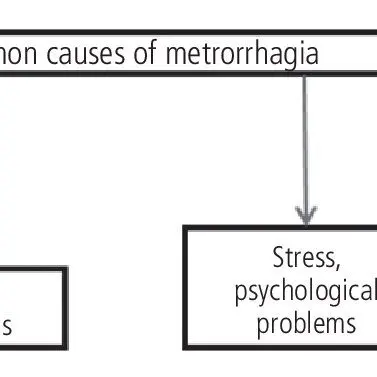Contents
Metrorrhagia
Metrorrhagia, loss of blood outside of menstruation, can most often signal a benign uterine pathology or a hormonal imbalance, more rarely be the first symptom of gynecological cancer or the sign of a general pathology. Metrorrhagia represents nearly a third of gynecological consultations.
What is metrorrhagia?
Definition
Metrorrhagia is bleeding that occurs outside of your period or without a period (before puberty or after menopause). These hemorrhages can be spontaneous or caused by sexual intercourse. In some cases, these metrorrhagia are associated with menorrhagia (abnormally heavy periods). We are talking about meno-metrorags.
Causes
Metrorrhagia can have many causes. The causes can be divided into 3 groups: organic causes linked to a lesion of the genital system (infectious pathologies, uterine endometriosis or adenomyosis, cancerous tumors of the cervix and vagina, polyps, uterine fibroids – very common, endometrial cancer, etc.), functional bleeding due to estrogen-progestogen imbalance (insufficient estrogen or progesterone secretion or iatrogenic uterine bleeding due to unbalanced treatment: estrogen-progestogen or progestin pills, anticoagulants) and bleeding that has a general cause (congenital anomalies of coagulation factors such as von Willebrand’s disease or acquired pathologies of haemostasis, for example hematologic malignancies, hypothyroidism, etc.)
Metrorrhagia can be related to pregnancy. Also, pregnancy is sought in women of childbearing age. But in a number of cases, no cause is found.
Diagnostic
The diagnosis is most often clinical. In the presence of metrorrhagia, to find the cause of these, a clinical examination is carried out. It is accompanied by an interrogation.
Additional examinations can be performed to make the diagnosis:
- pelvic and endovaginal ultrasound,
- hysterosalpingography (x-ray of the cavities of the uterus and fallopian tubes),
- hysteroscopy (endoscopic examination of the uterus),
- samples (biopsy, smear).
The people concerned
One in five women between the ages of 35 and 50 is affected by bleeding and menorrhagia (unusually heavy periods). Menometrorrhagia represent more than a third of consultations with the gynecologist.
Risk factors
There are risk factors for menorrhagia and metrorrhagia: excessive physical activity, consumption of drugs or excessive alcohol, anorexia or bulimia, diabetes, thyroid pathologies, taking a high-dose estrogen-progestogen contraceptive.
Symptoms of metrorrhagia
Blood loss outside of your period
You get metrorrhagia when you lose blood outside of your period. These hemorrhages can be black or red, be more or less important and have an impact on the general condition (they can lead to anemia).
Signs accompanying blood loss
The doctor will find out if these hemorrhages are accompanied by clots, pelvic pain, leucorrhoea,
Treatments for metrorrhagia
The goal of treatment is to stop bleeding, treat the cause, and prevent complications.
If the bleeding is due to a hormonal imbalance, frequent during menopause, the treatment consists of the prescription of hormones derived from progesterone or an IUD containing a derivative of progesterone (levonorgestrel). If this treatment is not sufficient, treatment is offered to remove the mucous membrane lining the inside of the uterus by hysteroscopy or curettage. Removal of the uterus or hysterectomy may be offered if this treatment fails.
If the metrorrhagia is related to a fibroid, the latter can be the subject of drug treatment: drugs that retard the growth of fibroids or alleviate their symptoms.
Polyps can be removed surgically, just like fibroids. Removal of the uterus is considered when the fibroids are too large or numerous.
When bleeding is due to cancer of the cervix, uterus or ovary, treatment is appropriate for the type of cancer and its stage.
Homeopathy can be effective in treating hormonal bleeding.
Prevent metrorrhagia
It is not possible to prevent metrorrhagia, except by avoiding risk factors: excessive physical activity, consumption of drugs or excessive alcohol, anorexia or bulimia, diabetes, thyroid pathologies, taking a high-dose estrogen-progestogen contraceptive.










